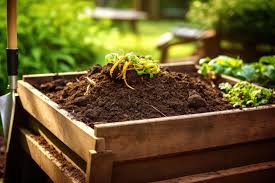
The Benefits of Composting for Your Garden
Composting is a simple and effective way to recycle organic waste and create nutrient-rich soil for your garden. Whether you are an experienced gardener or just starting out, composting can benefit your plants and the environment in many ways.
Benefits of Composting:
- Enriches Soil: Compost adds essential nutrients to the soil, improving its structure and fertility.
- Reduces Waste: By composting kitchen scraps and yard waste, you can divert organic materials from landfills, reducing methane emissions.
- Helps Retain Moisture: Compost helps soil retain moisture, reducing the need for frequent watering.
- Suppresses Plant Diseases: Healthy soil from compost can help plants resist diseases and pests.
- Promotes Biodiversity: Compost supports beneficial microorganisms and earthworms that contribute to a healthy ecosystem in your garden.
How to Start Composting:
To start composting, you will need a compost bin or pile in a sunny spot with good drainage. Add a mix of green materials (such as fruit scraps, grass clippings) and brown materials (such as leaves, straw) in layers. Keep the pile moist but not soggy, and turn it regularly to aerate the composting process.
With time and patience, your compost will break down into dark, crumbly soil that is perfect for enriching your garden beds. Remember to avoid adding meat, dairy, or oily foods to your compost pile to prevent odors and attract pests.
In Conclusion
Composting is a sustainable practice that benefits both your garden and the environment. By recycling organic waste into nutrient-rich soil amendment, you can improve plant growth, reduce waste sent to landfills, and support a healthier ecosystem in your backyard. Start composting today and reap the rewards of a greener garden!
Composting Basics: Understanding Definitions, Processes, Rules, and Getting Started
- What is the definition of composting?
- What is the process of composting?
- What is the first rule of composting?
- How do I start composting?
What is the definition of composting?
Composting is a natural process that involves the decomposition of organic materials, such as kitchen scraps, yard waste, and plant matter, into nutrient-rich soil amendment known as compost. Through the action of microorganisms like bacteria, fungi, and worms, organic materials break down over time to create a dark, crumbly substance that is beneficial for enriching garden soil. Composting is a sustainable practice that not only reduces waste sent to landfills but also promotes healthier plant growth and biodiversity in gardens.
What is the process of composting?
Composting is a natural process that transforms organic materials into nutrient-rich soil amendment. The process of composting involves creating a balanced mix of green (nitrogen-rich) and brown (carbon-rich) materials, such as kitchen scraps, yard waste, leaves, and twigs. These materials are layered in a compost bin or pile and moistened to create the ideal environment for microorganisms to break down the organic matter. Over time, as the materials decompose and heat up, beneficial bacteria and fungi work together to convert the waste into humus, a dark, crumbly substance that is full of nutrients beneficial for plants. Regular turning or aerating of the compost pile helps speed up the decomposition process by providing oxygen to the microorganisms. By understanding and following this process, gardeners can create their own nutrient-rich compost to enrich their soil and promote healthy plant growth.
What is the first rule of composting?
The first rule of composting is to balance the green and brown materials in your compost pile. Green materials, such as fruit and vegetable scraps, provide nitrogen, while brown materials, like leaves and straw, offer carbon. Maintaining a proper balance of these components is crucial for the success of your composting process. Too much nitrogen-rich green material can lead to a smelly and slimy pile, while an excess of carbon-rich brown material may slow down decomposition. By following this fundamental rule of composting, you can create a healthy environment for beneficial microorganisms to break down organic matter efficiently and transform it into nutrient-rich soil for your garden.
How do I start composting?
Starting composting is easy and rewarding! To begin composting, find a sunny spot in your yard with good drainage for your compost bin or pile. Collect a mix of green materials like fruit scraps and grass clippings, along with brown materials such as leaves and straw. Layer these materials in your compost pile, keeping it moist but not waterlogged. Remember to turn the pile regularly to aerate the composting process. With time and patience, you’ll soon have nutrient-rich compost to enhance your garden soil and reduce waste. Just avoid adding meat, dairy, or oily foods to keep your compost healthy and odor-free. Happy composting!
